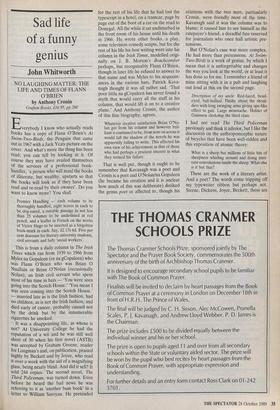Sad life of a funny genius
John Whitworth
NO LAUGHING MATTER: THE LIFE AND TIMES OF FLANN O'BRIEN by Anthony Cronin Grafton Books, £16.95, pp.260 Everybody I know who actually reads books has a copy of Flann O'Brien's At Swim-Two-Birds, the Penguin that came out in 1967 with a Jack Yeats picture on the cover. And what's more the thing has been read; you can tell by looking at it. Of course they may have availed themselves of the services of a professional book- handler, 'a person who will maul the books of illiterate, but wealthy, upstarts so that the books will look as if they have been read and re-read by their owners'. Do you want to know more? You shall.
Premier Handling — each volume to be thoroughly handled, eight leaves in each to be dog-eared, a suitable passage in not less than 25 volumes to be underlined in red pencil, and a leaflet in French on the works of Victor Hugo to be inserted as a forgotten book-mark in each. Say, £2 17s 6d. Five per cent discount for literary university students, civil servants and lady 'social workers'.
This is from a daily column in The Irish Times which ran from 1939 to 1966 from Myles na Gopaleen (or na gCopaleen) who was Flann O'Brien who was Brian 0 Nuallain or Brian O'Nolan (occasionally Nolan), an Irish civil servant who spent most of his time in bars — 'You were seen going into the Scotch House.' You mean I was seen coming into the Scotch House.' -- married late as is the Irish fashion, had no children, as is not the Irish fashion, and died early of cancer, probably caused not by the drink but by the innumerable cigarettes he smoked.
It was a disappointing life, as whose is not? At University College he had the reputation of a wit and he was still well short of 30 when his first novel (ASTB) was accepted by Graham Greene, reader for Longman's and, on publication, praised highly by Beckett and by Joyce, who read it over a week with the aid of a magnifying glass, being nearly blind. And did it sell? It sold 244 copies. The second novel, The Third Policeman, was turned down. Even before he heard the bad news he was referring to it as 'another bum book' in a letter to William Saroyan. He pretended for the rest of his life that he had lost the typescript in a hotel, on a tramcar, page by page out of the boot of a car on the road to Donegal. All the while it sat undisturbed in the front room of his house until his death in 1966. He wrote other books, a play, some television comedy scripts, but for the rest of his life his best writing went into his column in the Irish Times, modelled origi- nally on J. B. Morton's Beachcomber perhaps, but recognisably Flann O'Brien, though in later life he refused to answer to that name and was Myles to his acquaint- ances in the various bars. Patrick Kava- nagh thought it was all rather sad. 'That poor little na gCopaleen has never found a myth that would carry all the stuff in his column, that would lift it on to a creative plane.' And Anthony Cronin, the author of this fine biography, agrees.
Whatever creative satisfaction Brian O'No- Ian got from his column and however bril- liant it continued to be, from now on across it would fall the shadow of the novels he was apparently failing to write. This affected his own view of his achievement as that of those who had perhaps a prurient interest in what they termed his failure.
That is well put, though it ought to be remember that Kavanagh was a poet and Cronin is a poet and O'Nolanlna Gopaleen (he became his creation and it is unclear how much of this was deliberate) disliked the genus poet or affected to, though his
relations with the two men, particularly Cronin, were friendly most of the time Kavanagh said it was the column was to blame; it caused him to see himself as the ratepayer's friend, a dreadful fate reserved for journalists who once hail artistic pre- tensions.
But O'Nolan's case was more complex. He had more than pretensions. At Swim- Two-Birds is a work of genius, by which I mean that it is unforgettable and changes the way you look at the world, or at least it has done so for me. I remember a friend of mine sitting with it in a pub and laughing out loud at this on the second page.
Description of my uncle: Red-faced, bead- eyed, ball-bellied. Fleshy about the shoul- ders with long swinging arms giving ape-like effect to gait. Large moustache. Holder of Guinness clerkship the third class.
I had not read The Third Policeman previously and think it inferior, but I like the discussion on the anthropomorphic nature of bicycles that have been well-ridden and this exposition of atomic theory:
What is a sheep but millions of little bits of sheepness whirling around and doing intri- cate convolutions inside the sheep. What else is it but that?
These are the work of a literary artist. And a poet? The words come tripping off my typewriter ribbon but perhaps not. Sterne, Dickens, Joyce, Beckett, these are not poets or even 'poetic' (vile adjective). They are masters of our prose. And O'Nolan stands with them, not perhaps so high, if you must go in for these Literary Olympics, but in their company. If it should happen that you have not read him and this sad, well-written Life persuades you to do so, then you are in for a treat.



































































 Previous page
Previous page